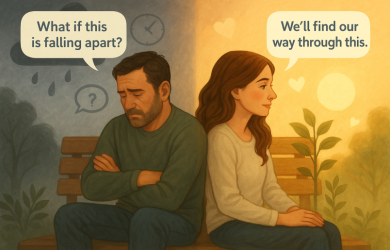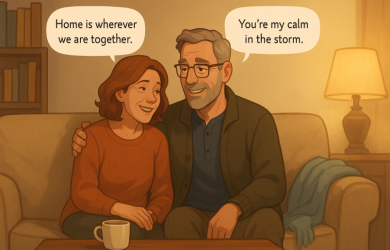9 Ways Confirmation Bias Affects Your Relationship

Heal & Grow Daily for a Happier Relationship
Subscribe FREEKey Takeaways
Marriage.com AI Quick Summary
Ever find yourself thinking, “There they go again…”—even when your partner hasn’t really done anything wrong?
It’s strange how our minds hold onto certain beliefs, almost like they’re trying to prove themselves right. Maybe it’s something they said once that stuck; perhaps it’s how someone else treated you before.
Either way, your brain starts picking up on patterns that aren’t always there… and soon, those patterns feel like proof.
We all want to feel secure and make sense of the person we’re with, but sometimes, that desire filters what we actually see. And just like that, the lens gets cloudy.
It’s not your fault. Most of us do it without even realizing it. There’s even a name for it: confirmation bias.
What is confirmation bias in relationships?
Confirmation bias in relationships is when your mind quietly starts looking for “evidence” to support what you already believe about your partner—whether it’s true or not. If you think they’re pulling away, suddenly, every late reply or quiet evening feels like proof.
We shape relational climates through our interactions. Confirmation theory highlights how validating, growth-encouraging messages promote healthier outcomes. Research across various relationships—romantic, familial, educational, and athletic—confirms that affirming communication improves well-being, while disconfirmation harms it.
It’s subtle, sneaky even, and it doesn’t mean you’re being dramatic. It’s just how the brain works sometimes—trying to protect you, trying to make sense of things. The confirmation bias definition, at its core, is simple: We notice what matches our expectations and often overlook what doesn’t.
9 ways confirmation bias affects your relationship
Even the strongest relationships can feel shaky when our thoughts begin to twist the story. It’s not always about what your partner did—sometimes, it’s about what you expected.
These little mental shortcuts can change how we see, hear, and react to the people we love most. Let’s look at how that plays out.
1. Misreading silence as disinterest
When someone you love goes quiet, it’s easy to assume the worst. If you’ve been feeling insecure, your mind might whisper, “They’re pulling away again.”
But maybe they’re just tired, stressed, or needing space. Confirmation bias makes you scan for signs that match your fear, ignoring any peaceful or loving moments in between.
-
What it looks like
You text, “I miss you,” and when they don’t reply for a few hours, your heart sinks. “See?” you think. “They don’t feel the same anymore.” In reality, they were in a meeting or just recharging. But the silence feels louder than it really is.
2. Focusing only on past mistakes
When trust is shaken—whether once or multiple times—your brain tends to hold onto that memory. Even if your partner is trying to do better, confirmation bias can make it hard to notice. Instead, you’ll feel like every small misstep is “proof” that they haven’t changed.
-
What it looks like
They arrive late, and suddenly, you remember every time they’ve done it before. “They never prioritize me,” you think, even if they apologized and made it up to you last week. That one moment becomes the entire story.
3. Overlooking genuine efforts
Love can be quiet—folded laundry, a thoughtful check-in, a small surprise after a long day. But if you’ve already decided your partner “doesn’t care,” those moments might slip right past you. You see what you expect, not what’s actually there.
-
What it looks like
They bring your favorite snack home, and you say, “Thanks,” but it barely registers. A few hours later, you think, “They don’t do anything for me.” One of the clearest confirmation bias examples—your brain filtered out what didn’t match your belief.
4. Jumping to conclusions too quickly
Sometimes, something small feels big just because of what we think it means. A glance at their phone, a joke that lands wrong, or a change in routine… suddenly becomes a sign. But often, there’s a simpler explanation.
-
What it looks like
They’re texting and smiling. Your heart jumps—Who is it? You assume they’re hiding something, and that spirals fast. Later, it turns out they were talking to their sibling or planning something for you. But the initial fear painted the whole moment.
5. Minimizing your own impact
It’s easy to notice when someone else hurts you—but not always when the roles reverse. Confirmation bias can make you see yourself as “always trying” and them as “never doing enough.” That imbalance builds resentment, even if it’s not the full truth.
-
What it looks like
You say, “I always have to remind you,” but forget the times they stepped up without being asked. You might feel exhausted, but they might feel invisible. Both are valid—and both need to be seen.
6. Assuming they “always” or “never” do things
Words like always and never feel powerful, but they rarely reflect reality. When you’re emotionally charged, those extremes show up fast. Your brain connects dots from past moments, stringing together a pattern—even when there isn’t one.
-
What it looks like
“You never listen to me!” you snap. They pause, surprised—because just yesterday, they stayed up late comforting you. But that one moment of feeling unheard overpowered all the rest. The bias took over the balance.
7. Comparing them to someone from your past
Old wounds leave familiar echoes. If a past partner hurt you, you might watch your current one through the same lens—waiting for them to do “the same thing.”
A study found that individuals tend to choose romantic partners with similar personalities across relationships based on self-reports from past and current partners. This similarity remains even after accounting for confounds, though it appears weaker among people who are higher in extraversion or openness to experience.
Even small similarities trigger alarm bells, even if the intent is totally different.
-
What it looks like
They cancel plans at the last minute and your stomach knots. “Just like before,” you whisper to yourself. But maybe this time, it’s not betrayal—it’s a sick day, a work call, or just a bad moment. But old patterns make it hard to see the difference.
8. Making everything feel personal
Not everything your partner does is about you—but when you’re already on edge, it can feel that way.
They’re quiet?
You assume they’re upset with you.
They want alone time?
You take it as rejection. The brain fills in blanks that don’t need filling.
-
What it looks like
They come home, barely say a word, and head to the shower. Your mind races: What did I do? Are they mad? Hours later, you learn they had a terrible day at work. But the hurt had already settled in.
9. Feeling stuck in the same loop
When you believe nothing will ever change, you stop noticing when it actually does. Even if your partner makes different choices, your brain files them under “temporary” or “not enough.” That mental loop can quietly sabotage even the progress you asked for.
-
What it looks like
They start expressing themselves more. They offer support without being asked. But your first thought? They’re just doing it for now… it won’t last. So you don’t acknowledge it—and they feel discouraged, too.
Can you overcome confirmation bias in a relationship?
Yes—you absolutely can. It doesn’t mean flipping a switch overnight or pretending the bias never existed. It means catching yourself in the moment… choosing to look again, listen again, and stay open just a little longer.
These shifts may feel small, but they’re powerful. With a little intention and a lot of heart, things can change.
1. Notice your mental patterns
The first step is simply becoming aware.
Ask yourself gently, “Am I seeing things as they are—or as I expect them to be?”
You don’t need all the answers, just the willingness to pause and reflect. Awareness won’t erase the bias, but it helps loosen its grip.
Do this:
- When upset, ask: “What else could be true?”
- Keep a journal of your recurring thoughts about your partner.
- Share a concern without accusing—use “I noticed…” instead of “You always…”
2. Look for contradicting evidence
If your mind tells you your partner “doesn’t care,” actively look for moments that show they do. This doesn’t mean forcing fake positivity—it means giving reality a fair shot. Balanced thinking creates space for healing, empathy, and trust.
Do this:
- Write down 3 small things your partner did this week that made you feel seen.
- Revisit past texts, notes, or gestures you may have overlooked.
- Say “thank you” aloud when they do something kind—even if it’s small.
3. Practice asking, not assuming
It’s easy to fill in the blanks, especially when emotions run high. But asking your partner directly—without blame—can stop the spiral before it starts. The answer might surprise you… or at least give you clarity.
Do this:
- Use questions like, “Can I ask how you meant that?” instead of reacting right away.
- If you’re unsure, say, “I’m having a hard time reading this situation.”
- Let them explain, even if you think you “already know.”
4. Reflect on your past triggers
Sometimes, your partner isn’t the problem—it’s an old story playing out again. Understanding your emotional history helps separate it from the present moment. It’s not about blame; it’s about healing and recognizing what’s yours to hold.
Do this:
- Notice when your reaction feels bigger than the situation.
- Talk to a therapist or coach about past patterns.
- Share your trigger with your partner so they can support you better.
Watch this video featuring Michelle Farris, a licensed psychotherapist, as she shares the secret to managing emotional triggers in relationships:
5. Celebrate the moments of growth
Every time you slow down, reframe a thought, or respond with care—you’re shifting something. Acknowledge that effort, both in yourself and in your partner. Growth doesn’t need to be perfect to be real.
Do this:
- Say, “I appreciate you trying,” even when the result isn’t flawless.
- Reflect monthly on how your relationship has changed, even in small ways.
- Celebrate emotional wins—like talking through something calmly or seeing things more clearly.
Shifting your perspective
It’s not about being perfect—it’s about being aware. When you catch yourself jumping to conclusions or seeing your partner through an old lens, take a breath… and look again. Sometimes, love gets tangled in fear, memories, or quiet expectations we never spoke out loud.
But with a little softness and a little curiosity, things can shift. You don’t have to rewrite your whole story overnight; just turning the page is enough for today. Relationships grow when we do—not by being right, but by being open.
And sometimes, the biggest changes start with one simple thought: What if I’m wrong?
 Tips
Tips
Write your tip or submit a video tip
All tips are reviewed before the publishing.
Share this article on
Recent Articles
Related Quizzes
Heal & Grow Daily for a Happier, Healthier Relationship
Subscribe FREE on YouTube We'd love your feedback!
We'd love your feedback!
 Expert Q&A
Expert Q&A
Ask your question related to this topic & get the support you deserve from experts.


 Reviewed by
Reviewed by
















 Thanks for your feedback!
Thanks for your feedback!